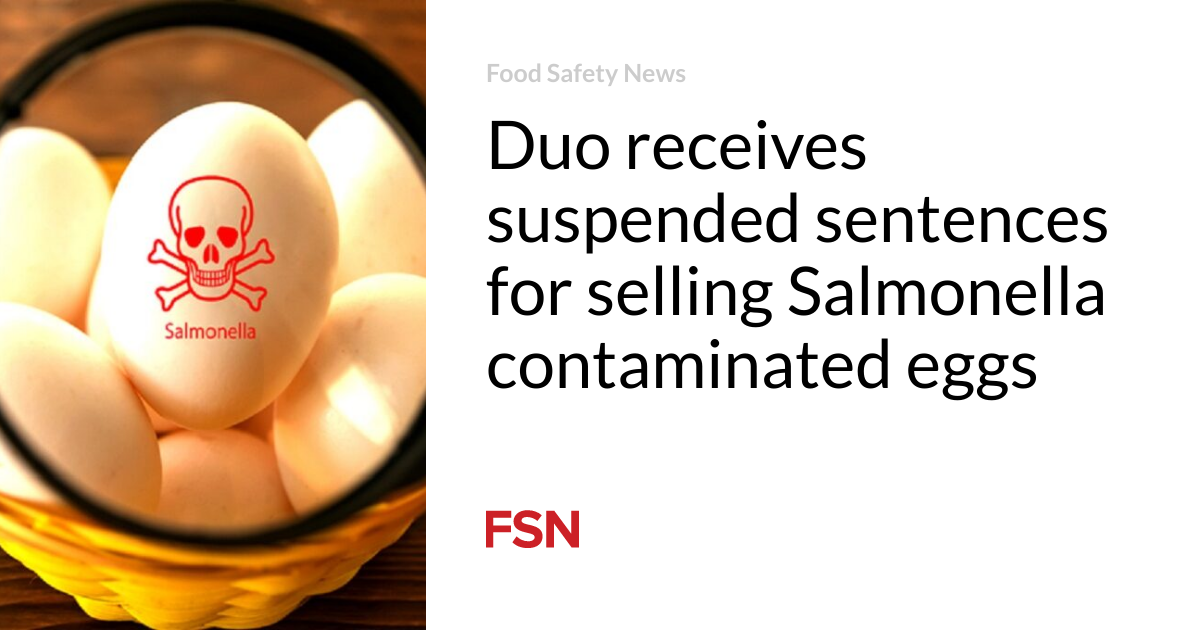Two men have been handed suspended prison sentences of six months in the Netherlands for their roles in the sale of Salmonella contaminated eggs.
The director and a manager at the implicated company were also ordered to do 200 hours of community service. Both men, aged 43 and 51, are still working in the poultry sector.
This company was fined €80,000 ($86,000), which was lower than the €140,000 ($150,400) asked for by the Public Prosecution Service (OM). The court in Zwolle said this was because of the considerable time that had passed since the incident.
The business was found guilty of placing eggs contaminated with Salmonella on the market when it knew this was harmful to health and concealed this information from customers.
In June 2017, a 22-year-old man died in Germany after illness from multiple organ failure because of blood poisoning. He was suffering from a Salmonella infection caused by eating food made with contaminated eggs. Salmonella was reported as the likely cause of blood poisoning.
Eight of 11 people who went to the barbecue in 2017 fell ill with Salmonella infections. Eggs were purchased from a supermarket in Germany and came from a Dutch poultry farm in Wouterswoude, which had three units for laying hens.
Timeline of events
The Dutch Food and Consumer Product Safety Authority (NVWA) took samples in the barns in Wouterswoude in July 2017. A total of 21 fecal samples were taken in three barns via overshoes and 20 were positive for Salmonella. Analysis showed there was a close genetic link between the strain found in German patients and positive samples from Wouterswoude.
In the Netherlands, recording of Salmonella on poultry farms takes place in a database. If a positive test is registered, a report is automatically sent to the NVWA so the agency can assess and limit the risk to public health. Poultry farmers should also contact the NVWA in the event of a positive Salmonella result. The court heard that between June 30, 2016, and June 29, 2017, no results of mandatory Salmonella tests done in units 1 and 2 were registered in this database.
Two samples taken in barn 2 on June 30 and July 13, 2016, were positive for Salmonella. The court said the defendant’s claim that they were taken outside the barn was “implausible”. A test later in July 2016 was negative. Several samples were done in quick succession, with the last one negative. The court said it appeared the defendant continued to sample until the result was negative. From July 2016 to early July 2017, no measures were taken to eradicate Salmonella in the affected barn.
Results of mandatory sampling that should have taken place in March or April 2017 were missing. One defendant said he had forgotten to carry out this sampling, but that he had done it in July 2017. These samples tested negative for Salmonella and were recorded in the database.
The court said it was of the opinion that both defendants knew there was Salmonella Enteritidis in barn 2, so deliberately did not test again. Two consignments of eggs were sent to a company in Germany in May 2017.
As Salmonella contamination was not recorded, the eggs could be sold as table eggs for human consumption when they should only have been sold as industrial eggs, which are not for people. Table eggs can be sold at a higher price and to a larger market.
(To sign up for a free subscription to Food Safety News, click here.)

